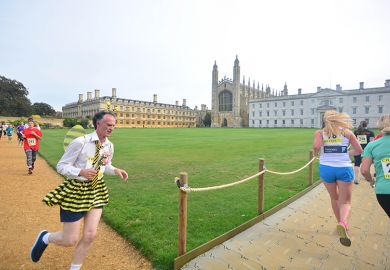Source: David Lyttleton
Whether it was Vince Cable, the business secretary, on “out of control” executive salaries, Eric Pickles, the communities and local government secretary, on “bloated” pay for town hall chiefs, or Occupy protesters on the steps of St Paul’s Cathedral targeting the so-called “1 per cent”, the issue of high pay remained in the public spotlight throughout the past financial year.
With pay freezes for millions of public sector workers and the UK double- dipping into recession, many from outside the traditional Left were happy to take a swipe at “unjustifiable” top-end pay.
So how did university leaders fare in a year when calls for pay restraint entered the political mainstream with a vengeance?
Not too badly, according to an analysis of 2011-12 university financial statements by the accountancy firm Grant Thornton for Times Higher Education.
When salaries, bonuses and benefits are considered, almost two-thirds of the UK’s vice-chancellors and principals - 98 in total - received increases greater than the £150 rise awarded to higher education staff nationally. Of those, 30 received at least an extra 10 per cent, with several picking up increases in excess of 20 per cent. Of the remaining third who did not receive a pay rise, about 20 had their pay frozen and some 25 took a pay cut, although some changes reflect costs associated with a change of office.
Many of the steepest rises were awarded to the leaders of post-1992 universities.
The pay of George Holmes, vice-chancellor of the University of Bolton, climbed by 25 per cent to £229,800 (or £256,200 when employer pension contributions are included) after he was awarded a one-off retention bonus of £42,700. That payment was made by the university’s remuneration committee to “incentivise the vice-chancellor to remain at Bolton to secure stable leadership during a time of change”, a spokesman for the institution says.
The bonus was issued shortly before Bolton announced plans in November to save £5 million a year after a 25 per cent drop in its student intake compared with 2011-12 levels. At that time, the university said that about 92 employees could be made redundant, although last week a spokesman stated that the restructuring process had concluded “with only seven compulsory redundancies”.
The pay of Nick Petford, vice-chancellor of the University of Northampton, also rose substantially thanks to bonus payments. His total salary increased by 21 per cent to £198,000 after “discretionary payments” worth £55,000 were added to his £143,000 basic pay.
The sums were approved by the university’s remuneration committee after Northampton made great strides in research, education, student satisfaction and graduate employability, a spokesman for the institution says.
The committee adds that Petford’s “starting salary…was a low base compared with the sector median” and that “competitive salary packages” were needed to attract good senior staff to lead the university.
Another vice-chancellor to pick up a healthy pay increase was Les Ebdon, whose salary and benefits excluding his pension rose by 13 per cent to £280,000 in his final year at the helm of the University of Bedfordshire.
Ebdon was attacked by the right-wing press last year after it was announced that he would succeed Sir Martin Harris as head of the Office for Fair Access in September, but any pain this caused might have been assuaged by the £32,000 pay increase he received from Bedfordshire “in recognition of his tremendous contribution” to the university. Under his leadership, the number of applications to Bedfordshire doubled and turnover rose from £81 million to £130 million over three years, a spokeswoman for the university says.
After the rise, Ebdon’s salary in 2011-12 outstripped that of Sir Leszek Borysiewicz at the University of Cambridge (£1,000) and Malcolm Grant at University College London (£9,616).
Benchmarking exercises were mentioned by the remuneration committees at the University of Warwick and at Durham University as reasons for large pay increases for their leaders.
At Warwick, Nigel Thrift’s pay and pension package rose by £42,000 to a total of £316,000 after his pay was “benchmarked” against his more highly paid Russell Group peers, says a university spokesman, adding that Thrift had opted not to take a salary increase between 2008-09 and 2010-11.
At Durham, Christopher Higgins’ pay and pensions package rose by 10 per cent to £269,000 after its remuneration committee decided to align his income “more closely with that paid by other leading universities in the UK”, a spokesman for the university says.
Such pay rises are an unintended consequence of the introduction, in the mid-1990s, of the obligation for universities to publish vice-chancellors’ pay in their annual accounts, says Michael Shattock, visiting professor at the Institute of Education, University of London and a former registrar at Warwick.

The 2.70 per cent average increase surpasses the 0.5 per cent awarded to rank-and-file staff. However, it arguably overstates the pay inflation benefiting the sector’s leadership
“Having greater transparency was meant to produce downwards pressure on pay, but it has actually put pressure on chairmen to increase salaries,” he says.
“Universities do not want to be seen to be paying staff below the market rate, particularly if they’ve done well.”
However, benchmarking is not the only reason for the increases, Shattock adds.
A tough financial settlement for higher education in 2011-12 and uncertainty ahead of the introduction of the new fees and funding regime in 2012-13 may have strengthened the hand of leaders who could offer stability amid the turbulence of reform, he says.
“There may have been a view among remuneration committees that universities were entering choppy waters with the new tuition fee structure and that their vice-chancellors deserved reward for preparing to meet the storm,” he says.
“But you might also argue that when academic and non-academic salaries are being held down to very modest salary settlements, chief executives should not benefit unequally. The phrase ‘We’re all in this together’ inevitably comes to mind.”
The 2.70 per cent average increase in vice-chancellors’ salaries and benefits clearly surpasses the 0.5 per cent awarded to rank-and-file staff (although the latter figure excludes incremental rises).
However, it arguably overstates the pay inflation benefiting the sector’s leadership: when pensions are included, the average rewards of office for vice-chancellors rose by only 0.49 per cent.
This may be due in part to a change in pension rules, which led to some of the leadership receiving lower pension payments or dropping out of the Universities Superannuation Scheme altogether in exchange for beefed-up basic salaries.
Under the changes, the total amount that can be paid into a pension pot while still being eligible for tax relief, known as the “lifetime allowance”, fell from £1.8 million to £1.5 million in April 2012, while the “annual allowance” was reduced from £250,000 to £50,000 in April 2011.
With many vice-chancellors likely to be close to both caps, pay packages have often been restructured via a “payment in lieu of pension contributions” to avoid staff breaching the levels and paying extra tax.
“It may seem like cash payments are going up, but it may be beneficial for both the university and the individual to change the remuneration package,” says Amanda Flint, a partner at Grant Thornton specialising in executive pay.
“All employers want to get the best bang for their buck, so what’s the use of paying remuneration to an individual in a form that will never be received due to all the taxes put on it?”
However, Sally Hunt, general secretary of the University and College Union, is less sympathetic, pointing out that most staff were not offered extra pay to compensate for the higher pension contributions effective from October 2011. (The USS member contributions rate had risen from 6.35 per cent to 7.5 per cent.)
“It looks very much like one rule for those at the top and one for everyone else,” she says. “The lack of self-awareness from university leaders when it comes to their own pay and perks continues to be an embarrassment for the sector.”
A spokesman for the Universities and Colleges Employers Association, which negotiates national pay levels, says that the majority of academic staff will have received a 3 per cent incremental rise in 2011-12, adding 1.6 per cent to the sector’s wage bill.
“Heads of institutions have shown restraint with the increase in their average remuneration in recent years, much in line with overall staff pay rises,” he adds.
But are vice-chancellors overpaid and, if so, compared with whom?

If the comparison is made with the private sector, they appear to be underpaid.
The vice-chancellor with the highest salary in 2011-12 was the University of Birmingham’s David Eastwood, who took home £372,000 in basic pay; he also collected £34,000 in pension contributions. (However, the highest remuneration package overall went to the University of Oxford’s Andrew Hamilton - see Top 10 by total remuneration PDF.)
That is dwarfed by the remuneration awarded to Mark Allan, chief executive of student housing company Unite Group. According to Unite’s accounts, he received not only £393,000 in basic pay but also a £428,370 performance- related bonus and £78,600 in pension contributions for the year ended February 2012 - a total package of almost £900,000, not including long-term share options.
The FTSE 250 company’s annual income of £219.5 million is less than half of Birmingham’s £472 million income in 2011-12 and only about a fifth of the University of Oxford’s £1 billion income over the same period. Oxford’s Hamilton received £371,000 in basic pay and £53,000 in pension contributions in 2011-12, less than half Allan’s income.
But is the comparison with the private sector reasonable?
While vice-chancellors might increasingly need to act like CEOs, captains of industry would surely claim that their business models - and levels of risk - are nothing like the work of politically protected institutions largely reliant on public funds (regardless of whether that money flows through research and teaching grants or state-subsidised student loans).
The lack of mobility between the worlds of big business and higher education also makes the executive pay comparison unwise, argues Roger Brown, professor of higher education policy at Liverpool Hope University. Universities tend to hire from within their own ranks and few vice- chancellors have left the sector to assume big roles in business, he observes.
And the lack of crossover between university leadership in the UK and the US renders any comparison of pay levels either side of the Atlantic of little value either, he adds.
In the US, 100 of 519 heads of higher education institutions were paid compensation packages worth more than £406,000 in 2010-11, with the average for heads of private institutions standing at $397,860 (£252,705). The equivalent figure for public institutions, which tend to be larger, was $421,395, according to a recent survey in the US press.
So where else could the sector look to benchmark vice-chancellors’ salaries?
As most universities are charities, institutions might think about the third sector. Barbara Stocking, Oxfam’s chief executive, was paid £109,100 in 2011-12 to run an organisation with 5,000 paid staff, 22,000 volunteers and a £385 million turnover. No vice-chancellor earned such a “low” salary that year.
The classic comparison is with the prime minister’s remuneration. However, in the Hutton Review of Fair Pay in the Public Sector, a report published in March 2011, Will Hutton, former Observer editor and former head of the Work Foundation, dismissed such “simplistic benchmarks” (David Cameron is paid £142,500 a year, although he is entitled to about £193,000). Instead, Hutton, who is now principal of Hertford College, Oxford, compared vice- chancellors’ salaries to those received by NHS chief executives, local government heads, four-star generals and permanent secretaries in the Civil Service.
Average pay for vice-chancellors was substantially higher than that for any of those public sector roles, having risen at a faster rate since 2000, the report found.
But higher salaries are justified because universities present more complicated issues than most public sector management jobs, including the need to raise income, according to Len Shackleton, professor of economics at the University of Buckingham.
The role “requires considerable academic credibility, as well as managerial experience and nous”, he says. “You have to be able to speak convincingly to business and government, at home and abroad, schmooze suspicious academic staff, students and lay governors, oversee extremely complicated administrative systems, make important strategic decisions and balance the books. It also gets more difficult all the time.
“People who can’t hack it have breakdowns. If financial problems emerge, people get the sack, even if this is often disguised as voluntary retirement through ill-health in line with the gentlemanly traditions of the sector.”
Vice-chancellors’ pay should be pitched somewhere between the remuneration of a FTSE company director and the salary of a highly paid civil servant, Shackleton believes, although it is “impossible” to say at exactly what level.
“It is such a difficult area as political spite and some degree of envy makes paying them anything above the minimum a matter of wild invective,” he says.
Register to continue
Why register?
- Registration is free and only takes a moment
- Once registered, you can read 3 articles a month
- Sign up for our newsletter
Subscribe
Or subscribe for unlimited access to:
- Unlimited access to news, views, insights & reviews
- Digital editions
- Digital access to THE’s university and college rankings analysis
Already registered or a current subscriber?













